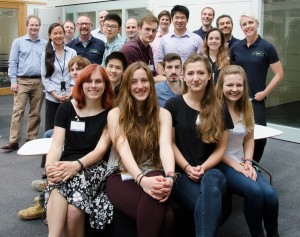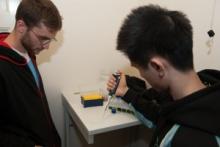Submitted by Jenny Molloy on Fri, 29/07/2016 - 18:20
The Cambridge-JIC iGEM Team consists of ten undergraduates from Engineering and Natural Sciences working for 10 weeks this summer to engineer future synthetic biology tools and applications. Cambridge Consultants are one of the group of supporters helping them to deliver.
The following was authored by iGEM team member Michael Gideon Friedman and is reposted with permission from the Cambridge Consultants blog.

Chloroplast engineering has the potential to revolutionise the field of synthetic biology. As the factory floor of the plant cell, the chloroplast can produce a variety of interesting compounds, with around 50x the efficiency of the rest of the cell. Its potential for biofuel and vaccine antigen production are especially relevant, with the current global warming and antibiotic crises. Yet since the first chloroplast transformation 28 years ago, little of this potential has been exploited, in the absence of a time-efficient chloroplast transformation protocol. We are currently in the exciting process of developing such a protocol, with supporting hardware, as the University of Cambridge’s entry for the 2016 iGEM synthetic biology competition.
Current chloroplast transformations can take months, due to the need to make sure that every one of the 80 or so copies of the chloroplast genome are transformed (also known as achieving homoplasmy), so yields are not diluted over time. We believe that we may be able to achieve this within mere weeks. Building on the pioneering work of the University of Cambridge plant sciences department (in which we are based), we aim to start our work in the single-celled alga Chlamydomonas reinhardtii.

The key technique underlying our protocol is a novel application of the revolutionary CRISPR/Cas9 technique. We will use it to propagate genetic modifications among all copies of the chloroplast genome, within a single generation. CRISPR/Cas9 has yet to be successfully expressed in Chlamydomonas, due to possible toxicity issues. However, attempts so far have been confined to nuclear transformation. The chloroplast is far closer to the prokaryotic environment in which CRISPR/Cas9 thrives.
We are in the final stages of designing 20 or so different genetic assemblies and protocols for testing. This places us on the cusp of submitting 20+ genetic parts, optimised for Chlamydomonas chloroplasts, to the international iGEM registry. We have also started building a low-cost facility for growing and imaging Chlamydomonas, investigated effective protocols for achieving and quantifying homoplasmy, and started developing mathematical models to predict the necessary timescales.
Although the project may seem ambitious in scope, we remain optimistic, with support from our team of dedicated advisors at the Cambridge plant sciences department and Cambridge Consultants. And the project’s applications don’t end at manufacturing compounds. As another example, making the chloroplast’s photosynthetic pathways turn on in the absence of light could make algae a viable source of oxygen for tissue-engineered implants. If the project succeeds, it will open up a new world of efficient chloroplast engineering to researchers and iGEM teams – a world which we look forward to being a part of.
Note from Cambridge Consultants:
Synthetic biology has huge potential to solve many of today’s critical challenges in healthcare, agriculture, energy and the environment. That’s why Cambridge Consultants has decided to sponsor the Cambridge University team at iGEM 2016 – the international genetically engineered machine competition run by MIT. As part of our sponsorship, we are acting as mentors – giving the team access to more than 700 Cambridge Consultants engineers and scientists worldwide to help solve problems during this year’s project.
The iGEM team is also grateful for support from:
- University of Cambridge, School of Biological Sciences
- OpenPlant
- BBSRC, the Wellcome Trust, and the Society for Experimental Biology

